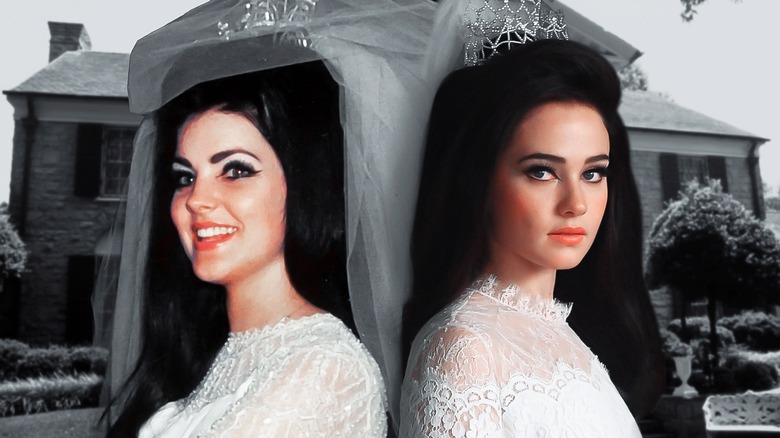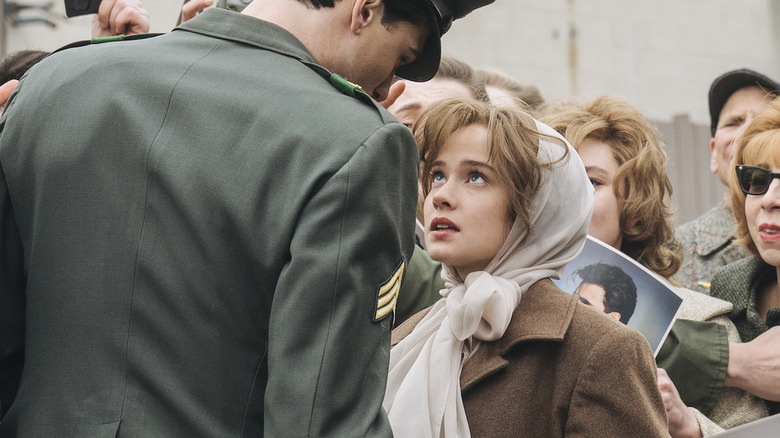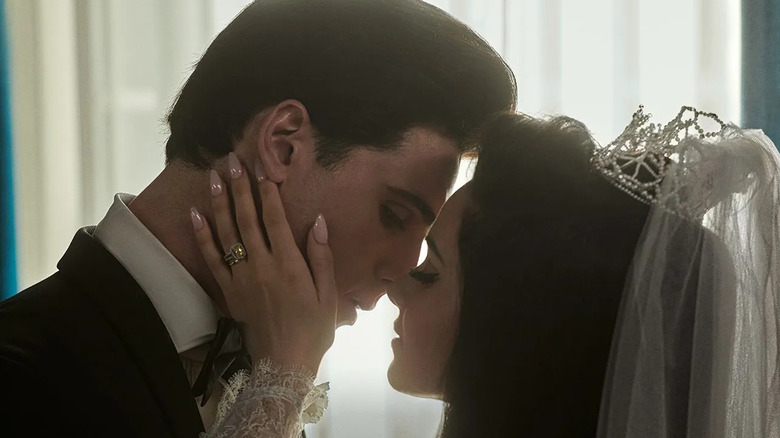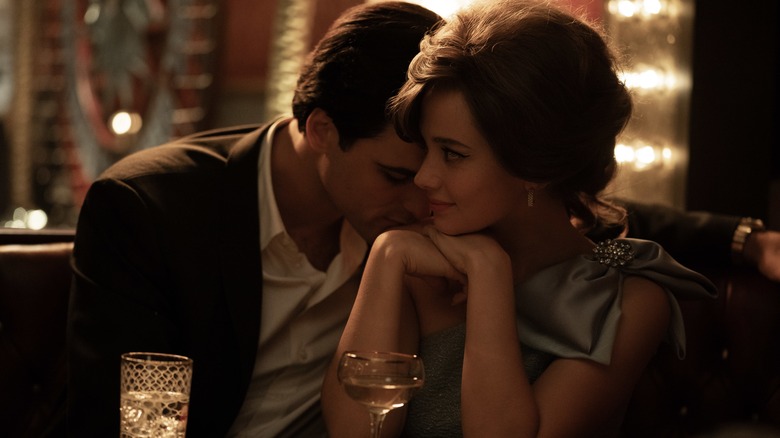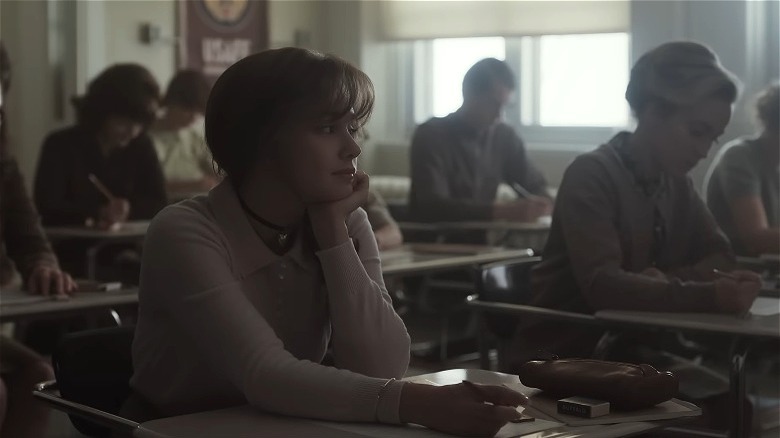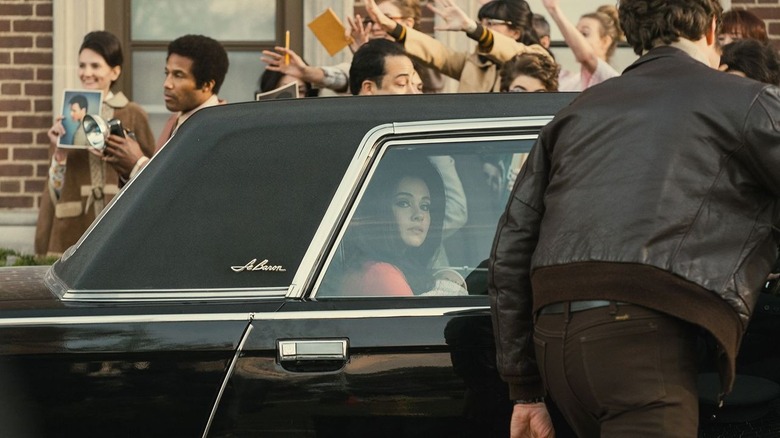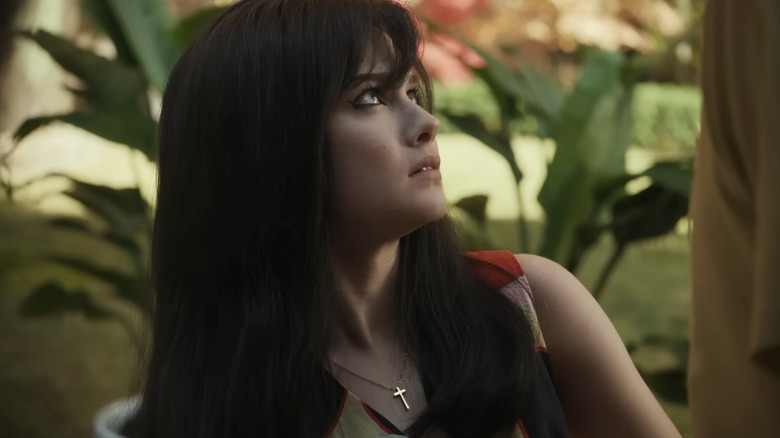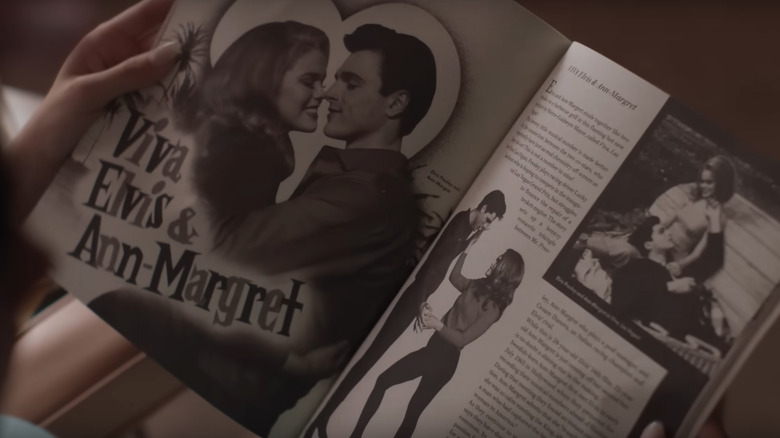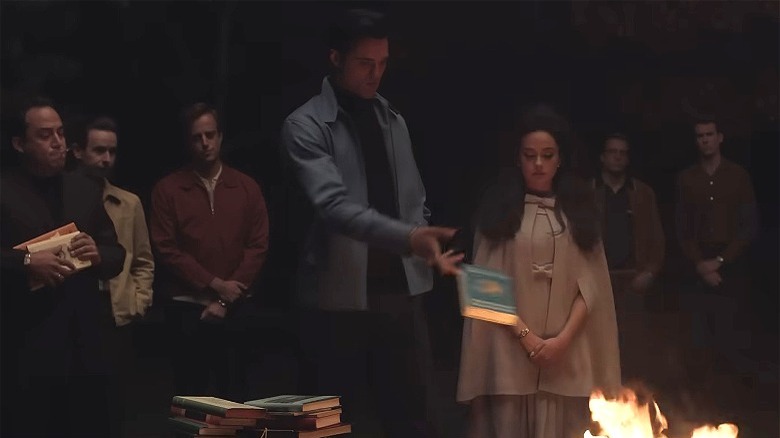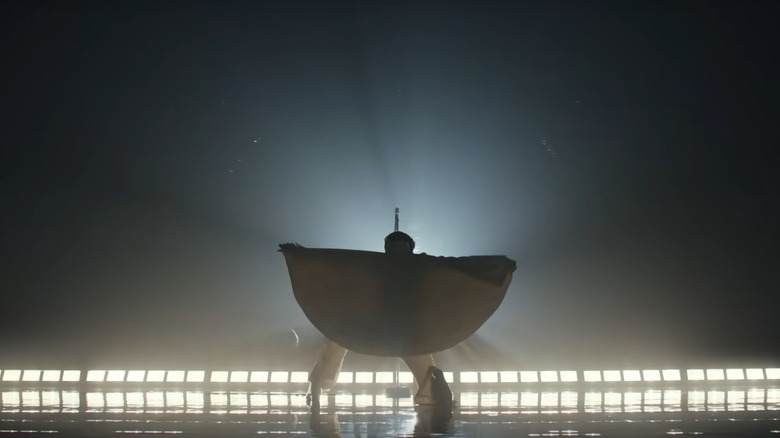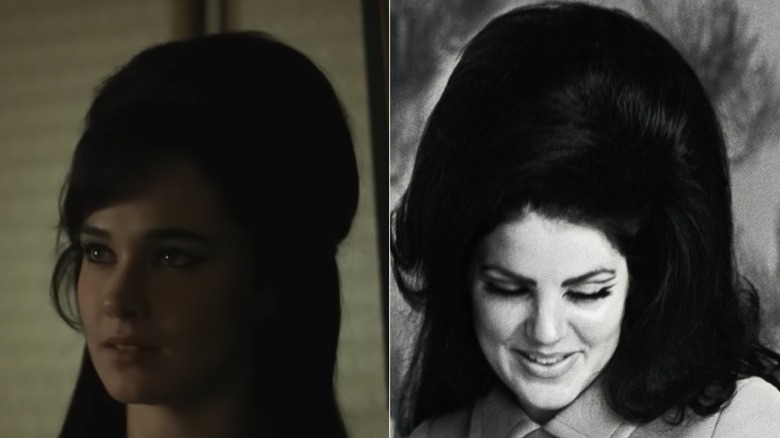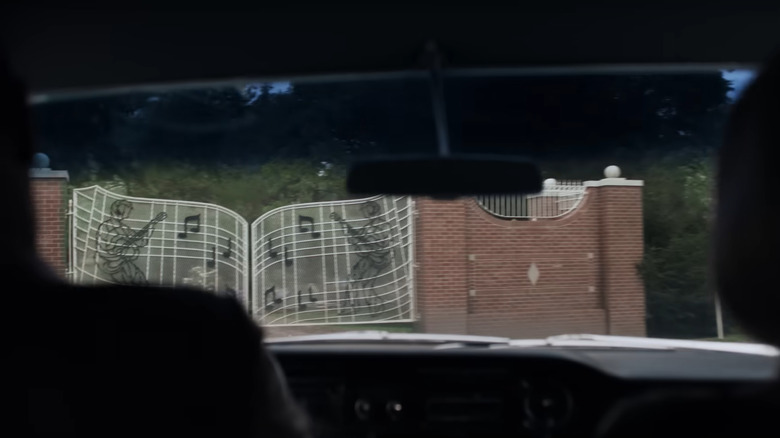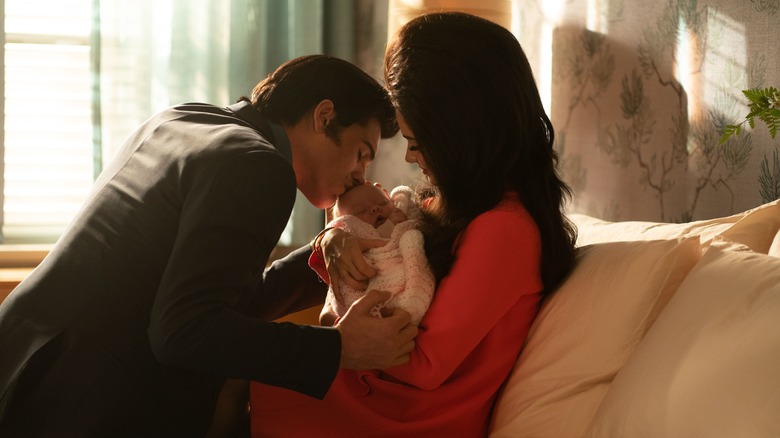Everything Priscilla Gets Right And Wrong About The True Story
This article contains discussion of grooming, drug abuse, domestic violence, and sexual assault. This article also contains spoilers for "Priscilla"
"Priscilla," written and directed by Sofia Coppola, is adapted from the 1985 memoir "Elvis and Me" by Priscilla Presley and Sandra Harmon. With the real Priscilla Presley involved in the adaptation as an executive producer, this film, starring Cailee Spaeny as Priscilla and Jacob Elordi as Elvis Presley, sticks close to her account of the romantic highs and disturbing lows of her 14-year relationship and six-year marriage with the King of Rock 'n Roll.
Whether the faithfulness of this adaptation equates to historical accuracy will be contested by different people for various reasons. Elvis Presley's estate has not only contested the accuracy of certain elements but disapproved of the film's whole existence — which isn't surprising, given its decidedly unflattering portrait of Elvis as a controlling, dishonest, and at times violently abusive partner. This article will examine how Coppola's "Priscilla" corresponds to the memoir and other historical accounts, as well as the areas where the filmmaker took artistic license by either choice or necessity.
How Priscilla and Elvis started dating
Where Baz Luhrmann's "Elvis" obscured the more uncomfortable details of Elvis and Priscilla's courtship, Sofia Coppola's "Priscilla" is upfront about the fact that Priscilla Beaulieu was 14 years old when she started seeing the then 24-year-old Elvis Presley. She was living at an American military base in West Germany, where a soldier named Currie Grant invited her to a party the recently-enlisted celebrity was also attending. The movie's depiction of their first meeting comes directly from Priscilla's memoir and its accompanying 1985 People magazine article, with Elvis laughing her off as "just a baby" before wanting to spend private time with her.
Priscilla's parents (played by Dagmara Domińczyk and Ari Cohen) weren't big on the idea of their daughter continuing to spend her evenings with an older man, but Priscilla continued to push to keep seeing him, and a house visit from Elvis, where he praised the girl's maturity and promised never to harm her, proved persuasive in letting the relationship continue. No one else in the movie expresses any concerns about their age gap — social mores in 1959 were very different from today, where such a relationship would rightfully be seen as a textbook case of grooming.
How chaste was Elvis before marriage?
One claim that Priscilla Presley has been insistent about, and that "Priscilla" reflects, is that Elvis did not have sexual intercourse with her until after their marriage in 1967. Despite her insistence, many people have had trouble believing this story. Writer Suzanne Finstad is one of the most outspoken skeptics on this issue, with her 1997 biography, "Child Bride: The Untold Story of Priscilla Beaulieu Presley," directly contradicting many parts of "Elvis and Me."
Despite these doubts, there is plentiful circumstantial evidence in favor of Priscilla telling the truth about this. Elvis' opposition to birth control makes it less likely that they would have had sex before Priscilla became pregnant with Lisa Marie, and Rita Moreno's account of her and Natalie Wood's time with Elvis points to him having a general reluctance about "doing it." Coppola's film presents Elvis as refusing or perhaps unable to provide for Priscilla's sexual needs, making for one of their relationship's biggest sources of ongoing conflict.
Reuniting with Elvis and drug problems
Around two years after Elvis Presley left Germany and parted ways with Priscilla in March 1960, he called her up and invited her to visit him for a couple of weeks, which turned into a surprise trip to Las Vegas. It's during this trip that the real Priscilla first recalls taking the sleeping pills and amphetamines that Elvis was hooked on. Elvis had previously given such pills to her while she was still on the army base in Germany, encouraging her to use amphetamines to keep up with her schoolwork after busy nights of partying, but Priscilla kept the pills as tokens of affection rather than using them.
The specifics of where Priscilla first took the pills differs between what she wrote about in the book and what's shown in the movie, with the former describing her taking them first in Vegas while the movie first shows her using drugs in Graceland. While the specifics might not be strictly accurate, the movie generally shows the progression of the couple's relationship and the way Elvis' problems with prescription drugs were passed on to his young girlfriend. One particularly scary scene allegedly taken from real life shows Priscilla passing out for two days after taking sleeping pills.
Priscilla bribed classmates to cheat on tests
Part of the agreement Elvis Presley made with Priscilla Beaulieu's parents to allow her to move in with him in 1963 was to guarantee that the 17-year-old girl would graduate high school. After making the big move, Priscilla was enrolled in the Immaculate Conception High School, an all-girls Catholic school. When you're partying with Elvis, however, studying isn't really a major priority, and taking drugs to stay awake isn't enough to prepare for finals.
To get good enough grades in algebra to graduate, Priscilla was willing to use her celebrity connection to cheat. As depicted in one of the movie's funnier scenes, Priscilla promised one of her classmates a chance to meet Elvis in exchange for being able to copy from her test. Elvis was proud of her for graduating, though at her request, he kept his distance from the actual graduation ceremony to avoid becoming too much of a distraction.
Elvis' control over Priscilla
One of the biggest takeaways from "Priscilla" is just how extensively Elvis controlled Priscilla's life during their time together. While he supported her schooling, he wouldn't let her apply for part-time jobs because he wanted her to be available for him at home as much as possible. Her iconic heavy eye makeup and giant black-dyed bouffant hairdo were his idea, and every outfit she wore had to have his approval. If he didn't like what she was wearing, he could get very angry and mean about it — and as their relationship deteriorated, Priscilla grew more willing to break his fashion rules.
The real Priscilla has described herself in this time as being "Elvis' living doll, to fashion as he pleased" (via Biography). This scenario of a woman being more or less held hostage to her partner's combination of personal dysfunctions and larger-than-life celebrity mythmaking is clearly one of the things that attracted Coppola to adapting Priscilla's memoir in the first place; the filmmaker has explored similar feelings of feminine isolation throughout her body of work.
Outbursts of violence
As much as Elvis spoke about not wanting to hurt Priscilla, his controlling nature could occasionally escalate into acts of violence. And it didn't always take a lot to provoke him: one such example of this, depicted early in the film, is when he punched Priscilla to win in a pillow fight, of all things. Later on, he's shown throwing a chair towards her after asking for her honest opinion about a song demo she disliked. Priscilla could also get violent in response, infamously throwing a vase while confronting Elvis about his affair with Ann-Margret.
One part of "Elvis and Me" that's been the subject of much controversy is where Priscilla describes an instance in 1972 where Elvis, as she put it in her memoir, "forcefully made love to me." She's since altered this recollection as being about rough but consensual sex rather than something worse. "Priscilla" avoids getting too graphic with the scene, but the film's version nonetheless leans towards a harsher assessment of the book's description, staging it as if Elvis is attempting to assault Priscilla before she stops him.
Confirmed and suspected affairs
Because "Priscilla" sticks entirely to the perspective of its main character, the movie reveals details about Elvis' life the way Priscilla learned about and perceived them. When Elvis is away from Priscilla, she reads about him having affairs with other women in tabloid magazines — and when he returns, he claims it's all made up. In the montage spanning from 1960 to 1962, Priscilla reads rumors about Elvis and Nancy Sinatra being a couple. In 1965, when Priscilla is alone in Graceland while Elvis has spent a long time away in Hollywood, rumors about him and his co-star Ann-Margret are a lot more infuriating.
In the case of Nancy Sinatra, it seems as if Elvis might have been telling the truth about the relationship being just rumors. Sinatra later claimed, "There was flirting, but just friendly flirting." With Ann-Margret, however, Priscilla's suspicions have been confirmed. The actress told the Las Vegas Review-Journal in 2021, "We dated, and we just had a great time together."
Perhaps to balance the fact that the movie doesn't directly depict Elvis' affairs, it also keeps its distance from delving too deep into Priscilla's affairs. The man with whom she had her most significant affair, the karate instructor Mike Stone (Evan Annisette), only appears briefly in two scenes. The film does not go into the ways that Stone helped Priscilla rebuild her life after her divorce — or the weird episode where Elvis tried to have him killed by a hitman.
Ending Elvis' spiritual phase by burning books
One of the strangest true stories presented in "Priscilla" is how Elvis went through a New Age spiritual phase under the influence of his hairstylist Larry Geller — and how Priscilla put a stop to it. In this era, the film shows Elvis leading a Bible study (making sure to add his two cents about which women Jesus found attractive), experimenting with LSD once alongside Priscilla, and constantly reading books about religion and philosophy in bed every night. That last issue only heightens Priscilla's feelings that she's not being given enough love and attention.
The solution to this problem? One night, Elvis, Priscilla, and others at Graceland have a bonfire and burn all of Elvis' books on spirituality, offering a dramatic and definitive ending to this phase of their lives. It's an odd little detour, made even odder by the way the film is edited to keep many scenes relatively brief and make big jumps between chapters, but it's probably one of the more exciting things that happened in Priscilla's long and lonely time in Graceland.
A lot of the music is anachronistic
Surprisingly for an Elvis-related movie — though less surprisingly for a movie destined to enrage the Elvis estate — "Priscilla" doesn't feature any Elvis recordings on its soundtrack. The King only sings twice in the movie, once on TV and once at a party with his head shown from behind. The singing is done by Coppola's husband, Thomas Mars, whose band Phoenix composed the film's original soundtrack with Sons of Raphael.
With Elvis' greatest hits off-limits, Coppola got creative with the soundtrack, which often enters playfully anachronistic territory similar to her 2006 film "Marie Antoinette." Some of the musical selections are period-appropriate, but then there are moments like "Crimson and Clover" by Tommy James and the Shondells being played in a scene set nine whole years before the song's 1968 release. "Baby, I Love You," which was featured in the film's teaser, is a borderline case: the 1963 Ronettes song fits the era of the scene, but the 1980 Ramones cover used in the film does not.
The final needle drop, however, is not only period-appropriate but has an unspoken relevance to the events of the film. The film ends with Priscilla driving away from Graceland in 1973 as Dolly Parton's "I Will Always Love You" plays. Elvis reportedly sung this song to Priscilla during their divorce proceedings and even tried to get permission to release his cover, but Dolly declined.
Priscilla's giant hair was actually bigger in real life
As an attempt at a grounded drama based on figures famous for their larger-than-life styles, some of the more out-there aspects of "Priscilla" actually had to be toned down from real life. During a press conference at the New York Film Festival (via YouTube), producer Youree Henley said that for many of the costumes in the film, "if you didn't have the reference, you almost wouldn't even believe it was real." Cailee Spaeny pointed to Priscilla's giant hairdo as an example of this, comparing it to "another head on top of your head" — and Henley pointed out that the wigs used for the movie were actually flattened out in comparison to their real-life reference!
Having a relatively smaller hairdo only serves to accentuate the height difference between Spaeny (5'1") and Jacob Elordi (6'5"). Spaeny and Elordi are only a year apart in age, so their dramatic difference in height does a lot in terms of selling their characters' age gap. It's worth noting that Elordi is over five inches taller than Elvis was, while Spaeny is almost three inches shorter than Priscilla's adult height.
Much of the Graceland design is fictionalized
It's no secret that the Elvis Presley estate hates "Priscilla." Officials speaking to TMZ slammed the film's quality and specifically criticized the set design, with one saying, "It feels like a college movie. The set designs are just horrific, it's not what Graceland looks like." While their artistic assessments have been heavily disputed by critics, who have generally loved the movie, there is likely factual truth in the claim that some sets are "not what Graceland looks like" — though it's not exactly the production's fault.
At the New York Film Festival press conference, production designer Tamara Deverell noted that Graceland's appearance in the early years was less documented than in later years, and that the upstairs quarters where much of the film takes place are notoriously off-limits to the public. As such, there was a lot of freedom to make stuff up for the design of things that the team couldn't base on direct references. It can't look exactly like Graceland because few people know exactly what these parts of Graceland look like.
There are a lot of big time skips in the film
Ultimately, most criticisms of the historical accuracy of "Priscilla" are going to be less about what is shown onscreen and more about what gets skipped over. Coppola's film includes multiple big time skips to emphasize the monotony of Priscilla's life. Months fly by in calendar montages; Lisa-Marie goes from a newborn to a three-year-old to a five-year-old. The skips get more significant toward the end of the film, with many of the specific details of Elvis and Priscilla's divorce elided in favor of depicting a much simpler switch from wanting to stay together to making a decision to leave.
Just because historical details aren't shown on-screen, however, doesn't mean that they weren't on the cast's minds while filming. According to Jacob Elordi at the New York Film Festival press conference, Cailee Spaeny annotated her script to include the details of everything that was happening in Priscilla's life between these big time jumps. This way, even if the film couldn't truly present the full story of Priscilla's life with Elvis, at least the actors had all the background info to make their performances as accurate as possible.
If you or anyone you know needs help with addiction issues, or may be the victim of child abuse, domestic abuse, or sexual assault, contact the relevant resources below:
- The Substance Abuse and Mental Health Services Administration website or contact SAMHSA's National Helpline at 1-800-662-HELP (4357).
- The Childhelp National Child Abuse Hotline at 1-800-4-A-Child (1-800-422-4453) or contact their live chat services.
- The National Domestic Violence Hotline at 1−800−799−7233. You can also find more information, resources, and support at their website.
- Visit the Rape, Abuse & Incest National Network website or contact RAINN's National Helpline at 1-800-656-HOPE (4673).
